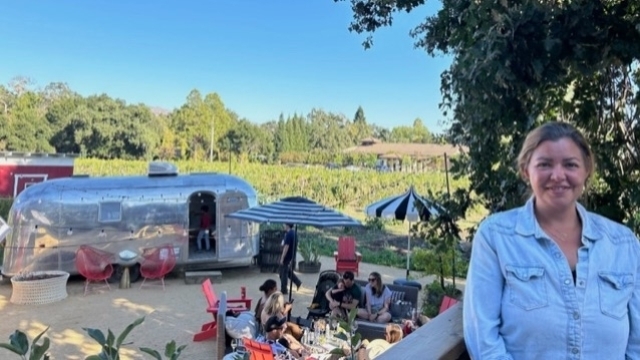by Kerana Todorov | Wine Business |
Napa County has spent more than $830,000 on outside counsel on its lawsuit against Hoopes Vineyard as of the end of September, according to the county.
And the matter is far from over.
Napa County, which seeks to recover its attorney fees and costs, has sued Hoopes Vineyard, a small winery on about 8 acres south of Yountville, arguing it needs a use permit in order to host tours and wine tastings.
A Napa County Superior Court judge is expected to hear pre-trial motions later this month, including whether or not two other small Napa Valley wineries – Smith-Madrone and Summit Lake Vineyards – can join Hoopes Vineyard’s and Lindsay Hoopes’ cross complaint against Napa County for alleged due process violations and other allegations.
A trial is set for late January in Napa County Superior Court.
In addition, on Nov. 8, the three wineries asked U.S. Attorney for the Northern District of California Ismail J. Ramsey, and California Attorney General Rob Bonta in a letter to launch an investigation into Napa County’s “egregious constitutional rights violations” against small wineries like theirs. Bonta’s and Ramsey’s offices could not be reached to comment.
Napa County is taking away property rights, Hoopes said on Nov.8. “So, they are taking away our livelihood, our ability to feed ourselves, our ability to function as businesses.”
“Whenever you take rights away without compensating somebody or you take you accuse people of violations without due process, or you do things as to one group that you’re not doing to another, those are all constitutional violations that are protected by the Civil Rights Act,” said Hoopes, a former San Francisco prosecutor who is now an adjunct professor at UC Law San Francisco,
The legal battle began in October 2022 when Napa County sued Hoopes Vineyard in Napa for conducting tours and wine tastings without the required use permit.
Other alleged violations included parking two air streamers on the property, hosting an animal sanctuary and yoga classes and selling produce not grown on the property along with cards, blankets, candles and soaps, according to the lawsuit.
But the way Hoopes sees it, the winery’s 1984 entitlements allows the sale, marketing and consumption of wine on the property which she purchased in 2017 to create a home for her family wine brand.
Her family, who has been growing grapes for nearly four decades, had been custom crushing wine since 1999.
Hoopes, who said in court filings she has spent $1 million in renovations in 2018 and 2019, has argued she should not have to re-apply for an expensive use permit.
“The County is essentially trying to take away property rights by making us re-apply for them and re-apply for them in a process that could theoretically take them away,” said Hoopes during a visit to the winery in October. “And they want to do it without compensation.”
Napa County has denied Hoopes Vineyards’ cross-complaint’s allegations and maintained the winery needs a use permit in order to host tours and wine tastings.
“It is unfortunate that Hoopes’ Vineyards has chosen to undertake a media campaign rather than allow the current litigation to decide the issues between it and the County,” said Art Hartinger, partner, Renne Public Law Group.
Both Hoopes Vineyard and Summit Lake Winery have a “Small Winery Use Permit Exemption” which “expressively prohibits tastings, unless the winery applies for and obtains a use permit,” Hartinger said. Smith-Madrone operates under a different land-use entitlement.
Smith-Madrone’s founder and general partner Stu Smith said his winery has had a use permit since 1973 which he understands allows for an unlimited number of visitors. The use permit was silent on events, he said.
Then about 1 ½ year ago, a county-wide winery database indicated that Smith-Madrone could only host 10 visitors a week and “zero” events. No one contacted the winery, he said. “This is not the way you do business in the Napa Valley.”
Summit Vineyards’ owners said they would need to upgrade an access road on their property, which they cannot afford, in order to obtain a use permit.
A succession of judges have been overseeing the case since October.
Napa County Superior Court Judge Cynthia Smith stepped down from the case in October at the request of Napa County’s attorneys after Smith disclosed during a hearing her husband works for Hundred Acre, a Napa Valley winery owned by Jason Woodbridge.
Woodbridge filed a lawsuit in October 2022 against Napa County over the development of a hillside vineyard on Pickett Road near Calistoga. The complaint alleged property rights deprivation and governmental overreach. That lawsuit remains in litigation.
The Hoopes Vineyard case was then re-assigned to Napa County Superior Court Judge Scott Young. But after Hoopes’ attorney opposed Young, the matter was turned over to Napa County Superior Court Judge Joseph Solga.
However, Napa County’s attorneys objected.
As of late last week, the case was in front of Napa County Judge Mark Boessenecker. The trial is set to begin Jan. 29.
In November 2022, Smith turned down Napa County’s request to order Hoopes Vineyard to stop operations. Smith concluded Napa County had “not made a strong showing of irreparable harm should the preliminary injunction be denied,” according to the court order.
The Napa County Board of Supervisors discussed the Hoopes Vineyard case in closed session on November 7. There was no reportable action.


